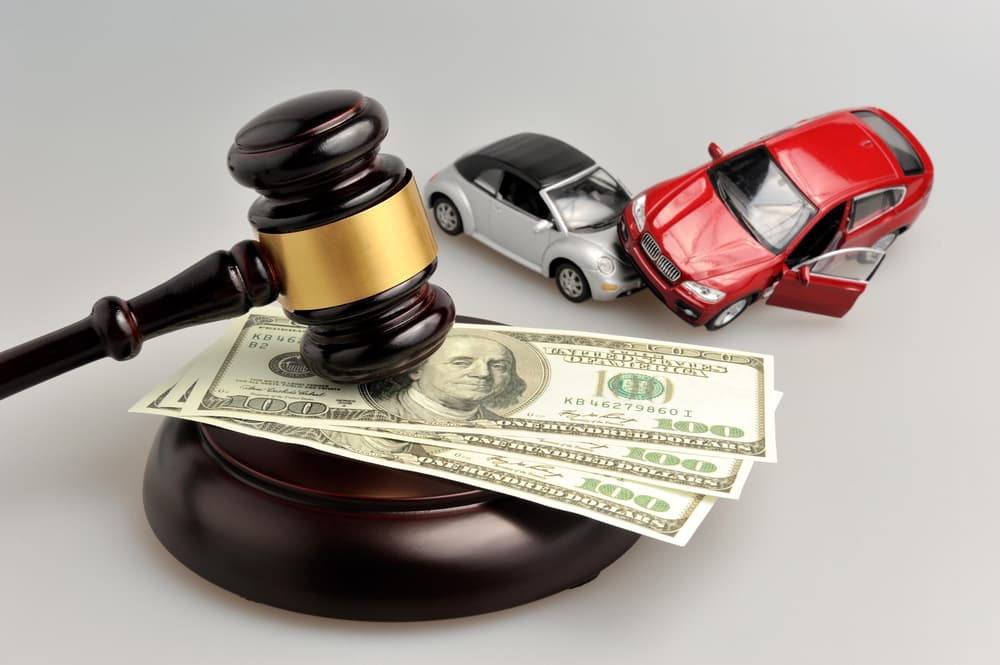Money can be a major concern after you have suffered an injury in a car accident. Besides dealing with your injuries, you must pay bills while you may be unable to earn income. Fortunately, you may qualify for compensation through a car accident claim.
First, you must prove that someone else was to blame for the accident. Then, they will have the obligation to pay for all of your damages, and their insurance company must pay you up to the policy limit. However, insurers do not voluntarily pay claimants the full amount they deserve.
To get full and fair compensation, you must know how much your injury-related losses are worth.
An experienced car accident attorney can accurately calculate your damages and advocate for that amount to insurers on your behalf. Always seek legal representation from the beginning of the car accident claim process.
Schedule a Free Initial Consultation Today!
You Must Know the Value of Your Case

You must know precisely how much your claim is worth to get everything you deserve, and you can bet that insurance companies have this exact knowledge right down to the dollar.
They have sophisticated programs that monitor claims in your area and nationally and, armed with this knowledge, set out to pay you as little as possible. Based on insurance companies' business model, paying you less than you deserve is a big win for them.
On the flip side, they will only grudgingly pay you the fair value of your claim after you have waged a tough battle.
The best way to have this necessary fight with the insurance company is when an experienced car accident lawyer represents you. Your lawyer has the same knowledge as the insurance company about the value of your claim and the skill and toughness to get what you deserve.
Hire a car accident lawyer right after you have suffered an injury to begin the legal process.
The Principles of Personal Injury Compensation
Knowing the principles underlying personal injury compensation is imperative to reach the maximum value of your car accident claim. The responsible party has the legal obligation to restore you to the position you were in right before the accident happened.
Of course, they cannot wave a wand that undoes the damage they have done to your health and life; however, they can pay to compensate you for your hardships.
Challenges in Estimating Your Car Accident Damages
You face numerous challenges when trying to estimate your car accident damages, including:
- You need to know the extent of your future damages at the time you file the claim or lawsuit
- Your car accident claim will include compensation for things that may be subjective
- The insurance company is going to have a far more restricted view of what you are claiming as damages
The Two Categories of Car Accident Damages
Your car accident damages generally fall into two categories:
- Economic damages cover your actual financial costs and losses due to the accident
- Non-economic damages pay for the experience that you have endured and will continue to go through in the future
Economic Damages from Your Car Accident
The intention for your economic damages is to pay for the out-of-pocket costs from the car accident and the money you are unable to make because of your injuries.
The first significant element of economic damages is your medical bills. Even if your insurance company paid for much of your coverage, you likely had a cost share or copayments. Then, your health insurance company will need to receive reimbursement for what they have already paid towards your care.
You will need to know the future cost of your care when you file the claim. The insurance company will not be obligated to make further payments once you have signed the release form. Thus, waiting until you have reached the point of maximum medical improvement before you file a car accident claim is better.
Lost Income in Your Car Accident Claim
You are also entitled to be paid for the money you might have earned but did not after your car accident, including payment for the time you missed from work.
If you suffer serious car accident injuries, they may change the course of your career, preventing you from reaching professional heights and goals.
The responsible party must also pay you for any loss in your earnings capacity, and there will be a big gap between your position and the insurance company's. Your lawyer will have to work with a vocational expert to prove what your career path might have been if you had not suffered an injury in the accident.
Non-Economic Damages from Your Car Accident
It is difficult enough to reach an agreement with the insurance company about your economic damages, and there is a wider gap when it comes to measuring non-economic damages.
Generally, your non-economic damages will include:
- Pain and suffering
- Loss of enjoyment of life
- Scarring and disfigurement
- Embarrassment and humiliation
- Emotional distress
Non-economic damages recognize that there is a cost to your physical injuries. They have caused you varying forms of discomfort in the past, and they will continue to do so in the future. You have the right to be compensated for these damages, too.
How Insurance Companies Calculate Pain and Suffering
Insurance companies will do everything possible to minimize your ordeal since the car accident. They will present you with their "objective" formulas for calculating pain and suffering that take you and your experience out of the equation.
Insurance companies' method of calculating pain and suffering depends on the extent of your injuries. They will use the multiplier method if you have suffered a long-term injury and will assign a multiplier to your medical costs based on the severity of your injury. The more serious your injuries, the higher the multiplier.
If you suffered a shorter-term injury, insurance companies may opt for the per diem method that assigns a daily value to the pain and suffering until you recover.
In either event, the insurance company will underestimate your pain and suffering, but a car accident lawyer can properly evaluate these damages and fight to recover them.
Negotiating with the Insurance Company
Ultimately, your claim is worth what you can get for your damages. You will reach a settlement agreement with the insurance company or attempt to persuade the jury to award what you seek.
The insurance company will make offers that do not reflect your reality. They are both testing you to see what you will accept and trying to save themselves money through a below-value settlement.
You can take comfort in knowing that the insurance company does not get to decide your compensation and will negotiate with you at arms-length. It takes two parties to reach an agreement, and the insurance company cannot dictate anything.
When the insurance company makes you a settlement offer, it may not be the good news you expect. Instead, it will show you how far you must go to reach an agreement.
Your attorney will review the settlement offer and advise you on whether to accept. If it is the initial offer, the advice will almost always be to reject it because you can get more.
Rejecting the Settlement Offer and Countering
The insurance company expects you to reject their initial settlement offer, and like any negotiator, they will never make their best offer first. Your attorney will then counter with what you want, either in an informal negotiation or through a demand letter.
You can expect this process to repeat as you exchange offers and counteroffers. Eventually, over time, your position and the insurance company's will begin to converge to the point where you will agree to a settlement.
Very few cases reach a settlement immediately, and the negotiation process will likely take months. If you settle your case for too little, you may have left money on the table; thus, you must fight for practically every dollar you get from an insurance company.
Taking Your Case to Court

You can go to court if the insurance company denies your claim or will not pay you enough. You will file a lawsuit against the responsible driver, which the insurance company will be obligated to defend.
You will then go through the litigation process until you reach a settlement or your case goes to a jury. In every trial, you have the burden of proof to demonstrate that the other driver was at fault and to show the full extent of your damages.
If you win your case, the jury will be the one to decide how much money you will get. Chances are that they will award you more than the insurance company would have in a settlement. The flip side is that you are taking the risk of getting nothing if you lose your case.
Insurance companies are also afraid of the jury because they know the jury can award a large verdict that they will be responsible for paying up to the policy limit. The policyholder may even sue an insurance company for bad faith if it had a reasonable chance to settle the case but did not.
Why You Need an Attorney
Statistics show that those who hire a car accident lawyer will have more money than those who try to represent themselves. This fact remains true even after you pay a lawyer their percentage of your settlement or award.
Insurance companies will give you more respect when you come with an attorney because they know you can sue them. Hiring a lawyer means you are not at the insurance company's mercy in the settlement procedure and changes the process from a dictation to a negotiation.
What a Car Accident Lawyer Does for Your Case
In the meantime, your lawyer will:
- Work with the relevant experts to determine the extent of your damages
- Compile the documentation that supports your claim for damages
- Present the claim to the insurance company or file a lawsuit in court on your behalf
- Negotiate with the insurance company, reviewing the offers that they make and responding with your figures
- Advise you about when to continue the negotiation process and when to take your case to court
A car accident settlement is your only chance to get money for your injuries, and you will have to sign an agreement that extinguishes your future legal rights. If you settled your case for too little, it is too late to do anything about it.
Unfortunately, many people who handle their claims realize this only after they have run out of money. An attorney is here to prevent that by maximizing the value of your car accident claim. You do not need to pay your attorney anything upfront to get them working on your side.
Never Wait to Consult a Car Accident Lawyer
In the aftermath of a car accident, time is of the essence. Waiting to seek a free consultation with a car accident lawyer can jeopardize your legal rights and hinder the collection of crucial evidence. Swift action can preserve witness testimony, gather accident reports, and assess the extent of your injuries.
A car accident lawyer can provide invaluable guidance on navigating insurance claims, determining liability, and pursuing compensation for medical expenses and damages. Don't delay – consult a personal injury lawyer promptly to safeguard your interests and ensure a strong foundation for your potential legal case.









